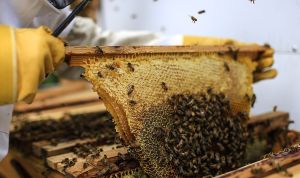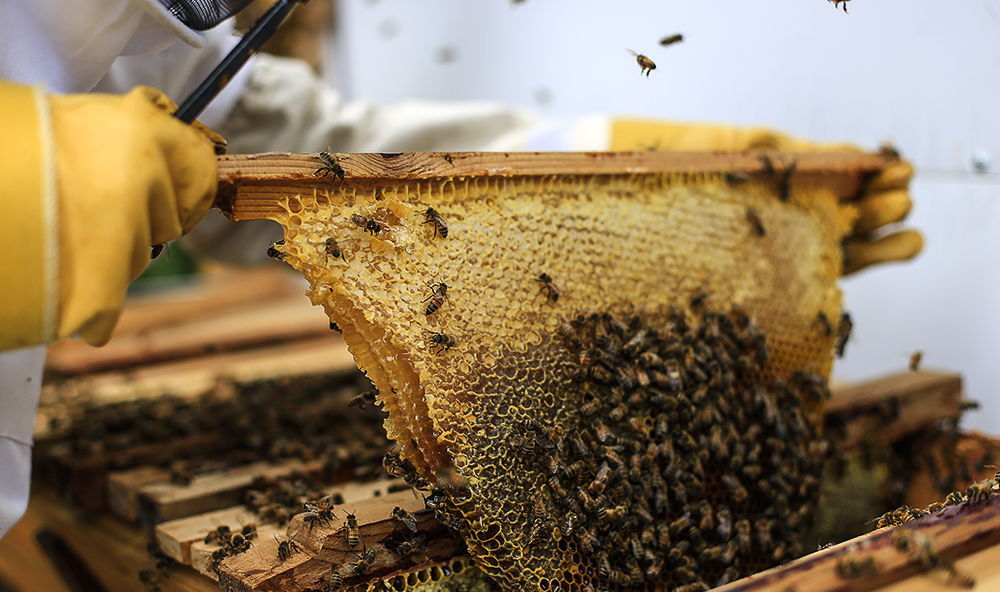
Pure raw honey is an unpasteurized and unfiltered sweetener made by bees from flower nectars. Most of the honey you see out there that we consume daily is processed. They have been filtered and heated after collecting from the hive. However, raw honey is unfiltered and non-heated, thereby retaining its incredible nutritional value and healthy powers.
We consume honey in different forms either by directly purchasing and consuming honey or products made with honey. Products like honey roasted peanuts, biscuits, etc. You might find raw honey at your local food store, the nearest grocery store, or better from a local beekeeper. You can also find it online.
How can you identify raw honey?
It is opaque rather than clear, sparkling or golden color achieved through heating. Raw honey should not be cooked. Cooking with raw honey will destroy its beneficial properties. It is most advisable to not store near a heat source. If you enjoy taking tea or coffee with honey, wait until the tea is slightly warm enough to sip comfortably, then you can add some honey. That is when you enjoy the nutritional benefit of honey. Not heated or hot, but slightly warm in a way you can easily sip comfortably. However, most people add honey to food when hot, which is not beneficial. It only serves as a sweetener in that hot condition.
You can consume honey in different ways. You can spray raw honey on breakfast, cereals, or on yogurt. It can be added to salad dressings, smoothies, fruit like apples and honey drew. It can be used as a healthy alternative to processed sugar in foods that doesn’t require heat. You can use two teaspoons of raw honey for every one teaspoon of sugar in any recipe.

How do you differentiate raw honey from Regular honey?
Raw honey is usually in its crude form immediately taken out of honeycomb cells within a beehive. This type of honey is not pure because it contains bee propolis and pollen which are both adding positive health benefits. Also common raw honey can contain legs, dead bees, and other impurities. Before bottling, those impurities will be strained out.
Raw honey cannot be heated above beehive normal temperature 95° Fahrenheit. Raw honey should not be pasteurized or filtered, but it can be strained. Additives should not be added. Rather commercial honey is usually processed heavily and may have been chemically refined. Honey processing is not healthy because excessive heating destroys natural vitamins, a common mineral, and enzymes in the honey. Processing and filtering remove many beneficial phytonutrients, including enzyme-rich propolis and pollen. You can only achieve a sparkling clear honey by heat. Golden syrup-like honey should be avoided in favor of opaque organic raw honey.
Regular honey, that is, the regular commercial honey can be gotten from bee treated with antibiotics like ciprofloxacin usually in China’s honey. In winter, the bees might be given nourishment in low-cost syrup or sugar form. Basically, beehives of Regular honey are made of nonorganic substances which can have pests in them. Raw honey should not contain additives. Usually, filtered and pasteurized honey can contain additives.
Have you heard of organic honey?
Organic honey is also known as raw honey. Organic honey doesn’t require heating above 95° Fahrenheit. To be called organic honey, it must abide by good organic management of each country’s conditions and set of standards. Honey processing should only be done by straining and gravitational settling.
Raw honey is not hard to find, but it can be expensive. Local farmers have them. The adulterated or regular honey are more in circulation. Some stores sell raw honey too if you take your time to search for it. Its health and nutritional benefits are more than the regular honey popularly advertised by vendors.
Written & Edited by: Mr. Adegbenro Tajudeen.
Entomologist, MyAgricWorld Agribusiness Consulting Firm



